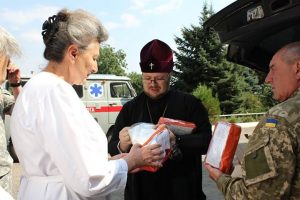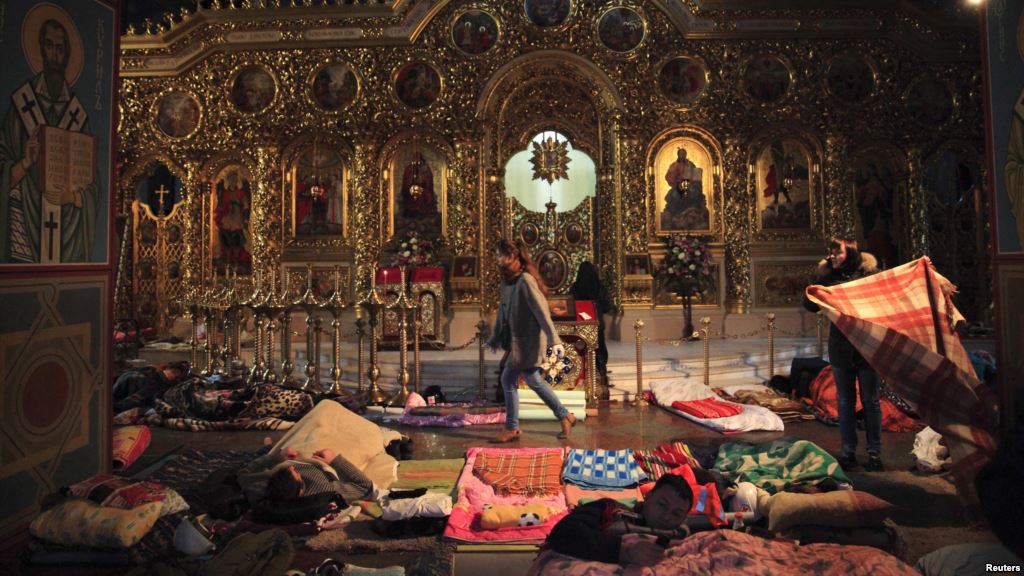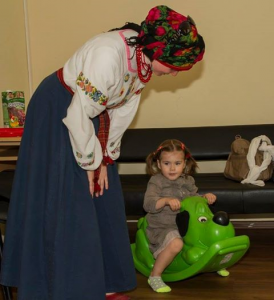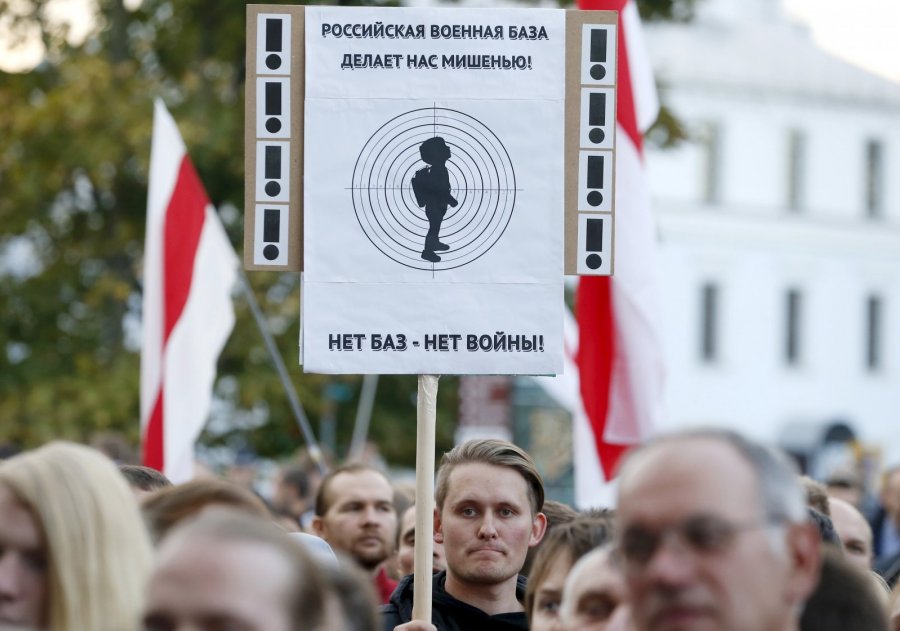Since the first protests on Maidan in 2013, Ukraine's religious communities have been active in helping those who need it most. Representatives of the Christian, Muslim, and Jewish communities are among the country's most trusted and respected volunteers, who continue serve as examples of strong interfaith and interpersonal cooperation.
Ukrainian Orthodox Church -- Kyiv Patriarchate
In the early days of the Revolution of dignity, churches in Kyiv opened their doors to the Maidan protesters and people brought food, warm clothes, and medicines for the Kyiv protestors to churches in other cities in Ukraine. With Russia's annexation of the Crimean peninsula and the beginning of Kremlin's military aggression in the Donbas, Ukrainian faithful of various religious denominations have been attending their places of worship not only to hear the word of God but also to bring assistance for Ukrainian soldiers and the internally displaced persons that continues without stopping.
At Kyiv's St. Michael's Golden-Domed Monastery a donation center has been operating for more than a year for the soldiers at the front and for the residents of those districts of the Donetsk and Luhansk oblast that are now under Ukrainian control. The Donetsk Eparchy of the Ukrainian Orthodox Church -- Kyiv Patriarchate, now located in Mariupol, is another permanent donation center, where volunteers distribute the collected aid. One of these volunteers is Bishop Serhiy (Horobtsov).

"Misfortune unites people," Bishop Serhiy explains "For example, Father Leonardo, a Roman Catholic priest, phones me, and asks if it would be possible to obtain an organ through the department of social services (at the Ukrainian Orthodox Church--Kyiv Patriarchate). I promised to ask and within a day Father Serhiy (Dmytriev) phoned to ask if anyone needed an organ. Or Protestants will call to say they need help for the wounded because they do not have bandages or hydrogen peroxide. I call His Holiness and two days later they send me everything," he says.
Bishop Serhiy is a displaced person as well. After being forced to leave Donetsk more than a year ago, he now lives in Mariupol, where he helps everyone who asks. He also takes part in the joint interfaith prayers for peace and Ukraine organized by the Ukrainian Orthodox Church -- Kyiv Patriarchate.
Ukrainian Greek Catholic Church
Parishes of the Ukrainian Greek Catholic Church (UGCC) throughout Ukraine have been actively supporting Ukrainian soldiers and their families as well as the displaced families and the families of the deceased soldiers. Churches in the synod have set up special departments to direct these volunteer initiatives.
Church leaders say providing spiritual support for Ukraine's defenders and their families and moral and material support for the victims of Russia's military aggression against Ukraine are among the most important tasks facing the Ukrainian Greek Catholic Church and the individual parishes. Additionally, under the patronage of the Pope, international charities such as Caritas have been working with both Roman and Greek Catholics.
According to Father Andriy from the UGCC Information Center, Caritas-Ukraine is active in Kyiv and throughout Ukraine. "They work with us in the social sphere, helping families," he says. "In the church we have a supervisory commission, for example, which does a lot for the military personnel and their families. They also work with families that have suffered during the war and who have post-traumatic stress syndrome. Our health committee works with them separately, and we have quite a few of these projects," he says.
Representatives of other Christian denominations, including several parishes from the Ukrainian Orthodox Church -- Moscow Patriarchate, have not remained on the sidelines and are helping the displaced. The faithful of the Lutheran and Protestant churches are supporting the residents of Donetsk and Luhansk oblasts who have remained in the war zone.
Muslim and Jewish communities help the displaced
The Muslim community of Ukraine has participated as well. In Kyiv, Muslim women from the Alraid organization provide help for the Central Clinical Military Hospital through the "home cooked food for military hospitals" initiative. The women get together and prepare homemade goodies, which they then bring to the hospital and distribute to the soldiers.
Ukraine's Muslim leaders have also been providing assistance to displaced families. According to Alraid project coordinator Tetiana Yevloyeva, before the beginning of the school year, Muslim families collected and donated necessary school items for the displaced children.
"Collecting various items for the displaced children was the idea of the women's volunteer organization Mariam. They asked for people to donate what they could. And those that could not buy either a notebook or a backpack were asked to donate money for their purchase ... Since I am frequently in touch with the volunteers from the Frolivska Street (collection point for volunteer aid for the displaced) in Kyiv, I was asked to bring everything that we collected there. I brought the items and bought some notebooks myself," Yevloyeva says.
She added that a blood drive was planned at the Islamic Cultural Center in Kyiv on Friday and that all concerned Ukrainians were invited to participate regardless of religious beliefs or ethnicity.
Similarly, Ukraine's Jewish community is helping the families of the displaced from Crimea and occupied Donbas with the support of international Jewish organizations. The first five hundred Jewish displaced people will find a new home near the village of Hnativka in the Kyiv Oblast. A comfortable settlement is being built for them there, which eventually will have a synagogue, school, rehabilitation and community center and so on. The Chief Rabbi of Ukraine Moshe Azman believes this is God's providence since Jews will be able to return to the place from which they were expelled by decree of a Russian tsar more than 100 years ago.
"It turns out that in this corner of the earth, where we are building a settlement for Jewish displaced persons, there is the tomb of the righteous Rabbi Mordechai of Chornobyl. He is the founder of the Chornobyl Hasidic dynasty. When I found out about it I understood that this is not an accidental place; it is a sacred place for Jews. And later it turned out that the village nearby is called Hnativka, which in the US is known as Natevka. Natevka is known around the world because this is where Tevye the milkman, the hero of Sholem Aleichem's stories, lived," Azman said.
Volunteers and religious communities work together
Maryna Lysak, coordinator of the charitable organization Everybody Can, says that the religious organizations not only give but also receive help from volunteers and charitable organizations because they are well organized and enjoy the confidence of the population.
"Among the aid recipients there are representatives of various religious communities and ethnic minorities. We began the assistance for displaced persons with the Crimean Tatar community. Then it happened that the Armenian, Roma, and Jewish minorities were added. These minorities receive constant help from us. Currently there are organizations such as "Save Ukraine," which is a mutual aid center. Its volunteers were the first to begin evacuating people from the war zones. The Christian religious community was able to rely on the assistance of the Jewish community, among others, during the most difficult days of Maidan," Lysak said.
After all, the Everybody Can fund, which today helps provide necessities for 35 Ukrainian hospitals, grew out of the Volunteer Brigade of Maidan, from people who believed and acted.
In fact, this slogan "believe and act" could be the motto of all the Ukrainian religious communities that have managed to unite people who hear the real voice of their faith. This will be the topic of discussion in Kharkiv, September 16, among the Christian, Muslim and Jewish participants at the conference focusing on religion and peace in Ukraine.






